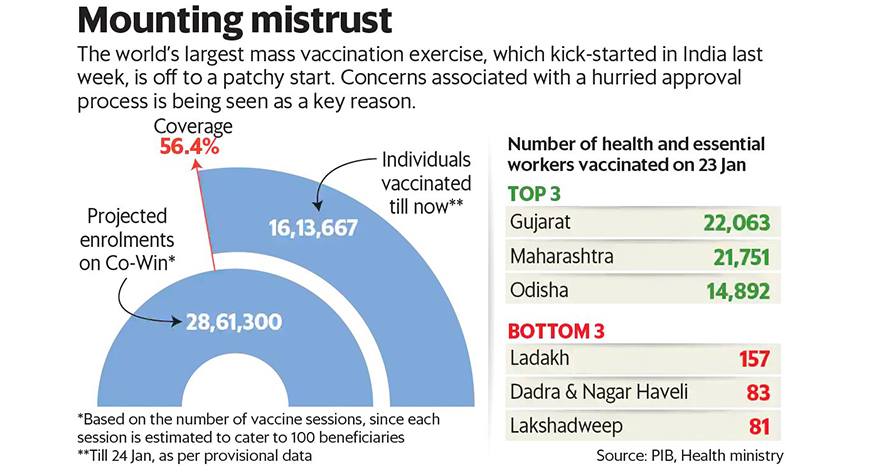Headlines of The Day
Scepticism dogs India’s covid-19 vaccination push
Many people across the country who have been selected to be inoculated with a priority covid jab have been a no-show. This must not come as a surprise as vaccine introductions are usually met with scepticism. Mint explains this reluctance among vaccine recipients.
What is the status of India’s vaccine rollout?
India’s nation-wide mass vaccination programme is in its second week and after nine days (till 24 January), India has inoculated 16,13,667 heath workers spread over 28,613 sessions. That’s a low turnout considering that one session is designed for 100 beneficiaries. Thereby, the coverage rate is around 56%. In other words, for every 100 people expected to be inoculated, 44 haven’t showed up thus far. On 23 January, the coverage rate was 44%. If less than the expected number show up, it would lead to vaccine wastage since open vials will have to be disposed off within a few hours.
Why did people resist vaccines in the past?
Every vaccine programme has had to deal with its share of rumour. The polio vaccine, some believed, would make children infertile. It was also rumoured that the production of the oral polio vaccine involved substances derived from pigs. The World Health Organization had to clarify that there were no products of porcine origin in the vaccine itself. More recently, bad news in terms of people falling unwell have led to doubt. During the human papillomavirus virus vaccine trials in Andhra Pradesh and Gujarat in the 2000s, some participants died. The deaths were not linked to the vaccine. Yet, it spread dread.

Why makes people distrust the covid-19 vaccines?
There are global rumours, one going so far as to suggest that the vaccines can tinker with the DNA, clearly a baseless claim. The more serious worry, for India, is the scepticism from the medical community. Vaccines typically take 8-9 years to make the journey from lab to approval. The covid vaccines have arrived in less than a year, sparking fear of undue rush.
What should be done to allay public fears?
Health experts have suggested that academics should be given access to more data from trials, to help decode the results. Second, an effective information, education and communication strategy is crucial. The ministry of health released a vaccine communication strategy document in December that mentions deploying expert endorsements. Advocacy from doctors, film and cricket personalities can spur adoption. The country’s political leadership should also be seen taking the vaccine first to instil confidence.
What role can the private sector play?
Many corporations have started planning in terms of bulk private purchase of the vaccine for employees, and, in some cases, suppliers. As inoculation can’t be made mandatory, every firm is likely to face the same resistance, now, seen among health workers. In the US, where the outbreak has been far more serious, several large corporations have started devising company-specific vaccination strategies. For many firms, especially ones that tend to be consumer-facing, it is a question of business continuity. -live Mint












